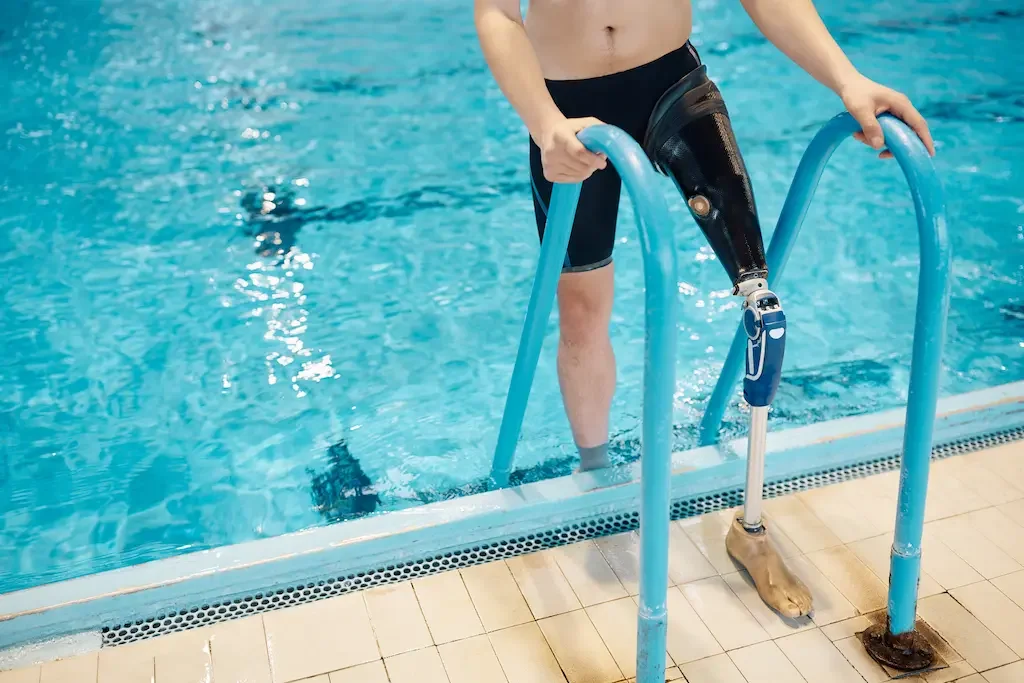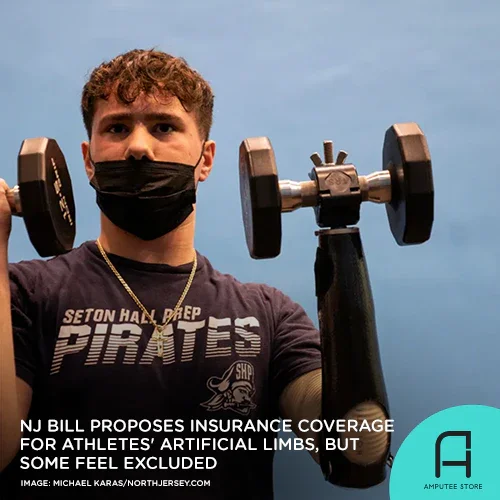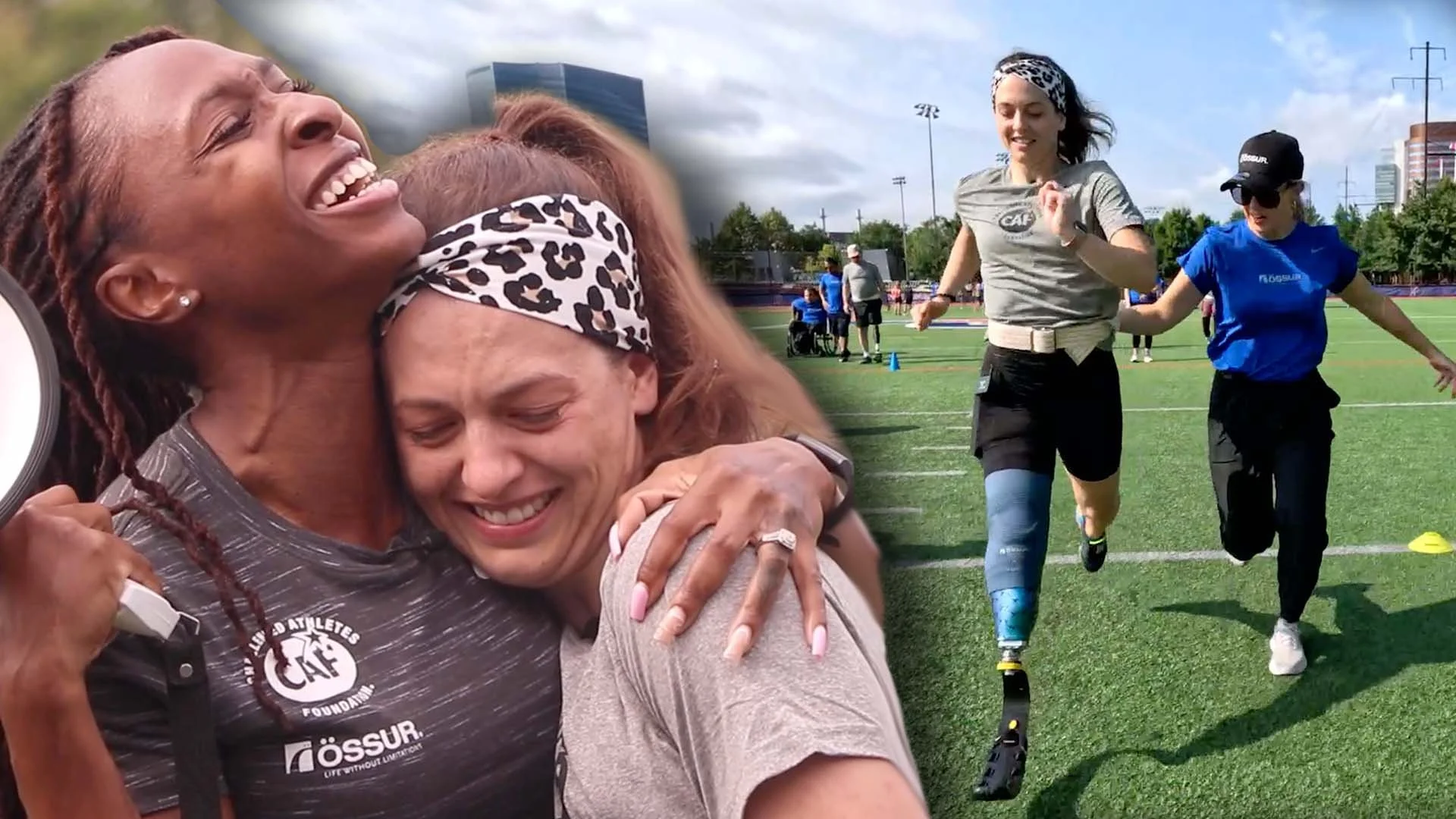New Jersey’s New Law
You May Qualify for a Second Prosthesis—Even for Everyday Activities
“Waterproof/low-risk prosthetic for pool use”
Great news for New Jersey amputees:
A new state law lets your doctor prescribe a second, activity-specific prosthesis or orthosis—and requires most NJ health plans to cover it when your doctor determines it’s necessary to enable physical or recreational activities. The law (P.L. 2025, c. 89; S-1439/A-3856) was signed July 8, 2025 and applies to policies issued or renewed on or after October 6, 2025.
What counts as “physical or recreational activities”?
The law lists examples like running, bicycling, swimming, climbing, skiing, snowboarding, and team/individual sports—but it’s not a closed list. If your everyday prosthesis isn’t safe or appropriate for certain activities, your doctor can determine that a second device is medically necessary.
Examples of Activities That May Qualify Under NJ’s New Law
Walking outdoors (parks, fields, uneven terrain) for safe mobility and independence
Swimming in a pool or at the beach for low-impact exercise and joint health
Playing a round of golf (listed as an individual sport; supports balance and endurance)
Running around with grandkids (everyday agility and play)
Light jogging or recreational running for cardiovascular fitness
Cycling (indoor or outdoor) for heart health and weight management
Climbing stairs or hiking trails for strengthening and balance training
Participating in physical therapy programs where a sport-specific limb helps regain strength safely
Gentle exercise for weight loss (walking programs, exercise classes, or treadmill routines)
Activities supporting mental health (outdoor walks, group classes, yoga with modified equipment, or any physical outlet that reduces stress and depression)
Strength and resistance training (at home or the gym) to improve bone health and overall fitness
Everyday wellness activities like gardening, housework, or light recreation where your daily prosthesis isn’t designed for repeated bending, kneeling, or stability
👉 The key is that your doctor documents why an additional device is necessary to safely and effectively engage in the activity. NJ.gov
“Physical therapist guiding prosthetic training for safe activity”
Which plans are included (and which are not)?
Included:
Individual health plans issued or renewed in New Jersey
Small-group and large-group fully insured employer plans
HMOs regulated by NJ
State Health Benefits Program (SHBP)
School Employees’ Health Benefits Program (SEHBP)
Not automatically included:
Medicaid (NJ FamilyCare): this law does not apply
Medicare and Medicare Advantage: federal programs not governed by state law
Self-funded (ERISA) employer plans: large employers that pay claims directly are exempt from state mandates
👉 If you’re on Medicare or Medicaid:
This law doesn’t guarantee coverage. But don’t be discouraged—here’s why it still matters:
A well-documented prescription for activity-specific devices (for walking, swimming, weight loss, mental-health movement, etc.) helps your case with your physician, philanthropies, or alternative funding.
Medicare Advantage plans may approve such devices when medical necessity is clearly documented.
Even denied claims build data and momentum toward the broader SEBCM movement. Your attempts help policymakers see the demand.
In many states, Medicaid is also starting to be included, like in Maryland—SEBCM laws there require coverage under both Medicaid and commercial plans.
How to talk to your Doctor
(script you can use)
Insurers want to see medical necessity and capability. Here’s how to frame the request:
“Under New Jersey’s 2025 law (P.L. 2025, c. 89), plans must cover an additional prosthesis or orthosis when you determine it’s necessary for me to participate in [swimming, walking safely outdoors, playing golf, exercising for weight loss, running with my grandkids]. My everyday device isn’t designed for this activity and increases my [fall risk/damage risk/pain/instability]. Could you document medical necessity and write a prescription for a second, activity-specific device?”
Ask your provider to include in the note and prescription:
“Additional prosthetic/orthotic device necessary to enable patient to engage in [specific activity].”
Frequency/intensity (e.g., “walks 4x/week; swims 2x/week; golf 2x/month”).
Why the daily prosthesis is not appropriate (safety, durability, waterproofing, energy return).
The health benefits tied to the activity (weight loss, diabetes management, bone health, mental health).
Plan for therapy/training to ensure safe use.
This mirrors how the law is written and what insurers expect to see. NJ.gov
✅ Documentation Checklist
(to a smooth insurance approval)
Doctor’s note using the language above, with activity details and safety rationale. NJ.gov
PT evaluation or progress notes (balance, gait, endurance; ability to use the activity device).
Device match to the activity (e.g., waterproof limb; energy‑storing foot; cycling or golf‑appropriate components).
Law citation on your request: P.L. 2025, c. 89 (S‑1439/A‑3856); applies at the policy’s first renewal on/after Oct 6, 2025. NJ.gov
“Amputee engaging in strength training—supports independence and function”
Timing & Eligibility FAQs
When does this start?
Coverage applies once your plan renews on or after October 6, 2025. NJ.gov
Does age matter?
No—the law applies to anyone with coverage under an included plan. Many patients use this to support safe walking, swimming, or play with grandkids. NJ.gov
What about Medicare/Medicaid?
The mandate does not apply, but you can still ask your doctor for a prescription. Medicare Advantage plans in particular sometimes approve activity-specific prostheses with strong documentation. Medicaid recipients may explore appeals, grants, or charitable support. NJ.gov
What if my employer has a self-funded plan?
State mandates usually don’t apply. Ask HR if your plan will voluntarily mirror NJ’s standard—some do when presented with safety and health benefits. NJ.gov
If you’re denied…
Request the denial in writing to see why (plan type vs. medical necessity).
Appeal with supporting documentation from your doctor and prosthetist.
For Medicare/Medicaid: use the denial as part of your case for appeals or alternate funding.
For self-funded employer plans: emphasize the long-term cost savings of preventing falls, damage, and health complications. NJ.gov
We’re here to help
(Monmouth & Ocean Counties)
At Manfredi O&P Affiliates, we’ll work directly with your physician to document medical necessity, recommend the right components, and guide you through the insurance process. Whether your goals are weight loss, mental health, safe walking outdoors, swimming, golf, or simply keeping up with the grandkids, we’ll help you make the strongest possible case for coverage.
This Is Just the Beginning—A Growing National Movement
New Jersey is part of a wider momentum: a national advocacy campaign, "So Every BODY Can Move" (SEBCM), is pushing state legislatures to require insurance coverage for activity-specific prosthetic/orthotic devices needed for physical activity and wellness. Illinois+11Össur+11Amplitude+11
States That Have Already Passed SEBCM Laws (as of mid-2025):
Maine, Arkansas, New Mexico — laws already in effect
Colorado, Illinois, New Jersey — passed, effective January 1, 2025 or later
Maryland also recently enacted its SEBCM law, requiring both state Medicaid and commercial plans to cover activity-focused prosthetics like for running, swimming, biking. Össur+2So Every BODY Can Move+2Limber P&O+3Amplitude+3CBS News+3
In 2025 alone, four more states enacted these laws: Washington, Georgia, Oregon, and New Jersey, bringing the total to 12 states—nearly halfway to SEBCM’s goal of 28 states by 2028. Amplitude+1
What’s Next?
Advocates anticipate 20+ additional states will introduce SEBCM bills in 2025, including Massachusetts, New Hampshire, Florida, and Pennsylvania. Amplitude
All of this builds on a long history—over 20 states have passed “insurance fairness” or prosthetic parity laws since the early 2000s, which require general prosthetic coverage comparable to Medicare. SEBCM expands on that foundation to include activity-specific needs. kffhealthnews.org+7So Every BODY Can Move+7Amplitude+7
While there's no federal law yet, SEBCM shows that amputee patients nationwide are gaining traction and state-level support. Meanwhile, the Prosthetics & Custom Orthotics Parity Act of 2010 was introduced in Congress—but hasn’t passed. congress.govpbs.org
How You Can Get Involved
This new law in New Jersey is just the beginning. Across the country, amputees and their families are helping shape the future of prosthetic coverage. Here’s how you can take part:
Share Your Story: Legislators respond to real experiences. Write a short note about how a second prosthesis would improve your health, independence, or ability to spend time with your family.
Join Advocacy Groups: Follow and support organizations like So EveryBODY Can Move, the Amputee Coalition, and local amputee support groups. They provide updates, action alerts, and template letters you can send to lawmakers.
Contact Your Representatives: Call or email your NJ Assembly member and State Senator to thank them for supporting this law, and ask them to keep pushing for broader coverage (including Medicare and Medicaid). You can find your legislators here: https://www.njleg.state.nj.us/members.
Spread the Word: Talk with your doctor, prosthetist, friends, and family. The more people know about this law, the more pressure builds for other states and eventually Congress to act.
Participate in Public Comment: When insurance regulators or state agencies ask for feedback, patients’ voices are powerful in shaping how laws are implemented.
Why it matters: The national goal of the So EveryBODY Can Move campaign is to see these protections passed in 28 states by 2028, creating enough momentum for federal legislation. Your voice—whether it’s a phone call, letter, or conversation—helps keep the movement alive.
“Adaptive runner using a sport-specific prosthetic leg”
Sources:
Official chapter law (P.L. 2025, c. 89)—text with examples and coverage scope; includes 90‑day effective‑date clause. NJ.gov+1
NJ Mandated Health Benefits Advisory Commission study of A‑3856—confirms scope, excludes Medicaid, discusses medical/mental‑health benefits of activity. NJ.gov
Bill status & approval (S‑1439)—confirmation of July 8, 2025 enactment. FastDemocracy
Advocacy overview (So EveryBODY Can Move – NJ)—background on the policy intent. So Every BODY Can Move
DOBI explainer on state mandates & self‑funded plans—why ERISA plans may not be bound. NJ.gov
Living with Amplitude – Insurance Reform for Amputees
Living with Amplitude – Does Insurance Cover Prosthetics?
So EveryBODY Can Move – Policy Brief (PDF)
Oregon Capital Chronicle – Insurers Question Prosthetic Coverage
ABC News – Insurers Limit Prosthetic Coverage





